|
IN
THE NEWS | ART BEAT | DIRT September 8, 2005 |
|
On a sunny afternoon in early June, a group of florists, growers, scientists and journalists gathered in a conference room on the second floor of San Francisco's Ferry Building. They were there for a symposium on sustainable cut flower production, but the main event was the announcement of a new certification program -- a kind of eco-label for flowers -- called Veriflora.
Jeff Stephens, communications director for SCS (Scientific Certification Systems), the company that runs the Veriflora program, described how the label would work. Growers would have to pass an independent audit of their environmental and social practices. Certified flowers could then be sold under the Veriflora label to consumers who like to vote with their dollars by purchasing fair trade coffee and other socially responsible products. At the end of his presentation, Stephens made a comment that passed mostly unnoticed among the group. "Just yesterday," he said, "we certified a major California grower of lilies, irises and tulips." I was in the room that day, and I knew that he had to be talking about Sun Valley Floral Farms. After the conference I pulled him aside, and, sure enough, he confirmed that the ink on Sun Valley's certificate was barely dry. This is no small matter. The Veriflora standard, while still in draft form, is surprisingly ambitious in its scope. Veriflora growers have to agree to use sustainable agricultural practices, including reduced pesticide spraying and conservation of water, and they must develop a plan to transition each crop to organic production. By accepting the Veriflora certification, Sun Valley was agreeing to wade even more deeply into the uncertain waters of large-scale organic flower production. |
Where to buy organic and eco-friendly flowers
|
Does this mean that Sun Valley's Arcata farm will be organic overnight? No. But it does represent a significant commitment to sustainable farming practices that will lead to the use of more organic techniques over time. And when such a major cut flower grower takes a stand like that, the rest of the industry can't help but notice.
Eco-label for earth muffins
Although the Veriflora label is aimed at consumers, there was not exactly a groundswell of demand for it. A florist in Eugene, Ore., was quoted recently in a floriculture trade journal as saying, "The bulk of consumers already have an assumption that flowers are an organic thing. We're 'earth muffins' here. We wear tie-dyed and I don't have any customer requests (for organic flowers), almost ever." If customers aren't asking for it, it won't just appear on its own. And if you've ever tried calling a florist and asking for organic or sustainable flowers to send to your mother on Mother's Day -- well, good luck.
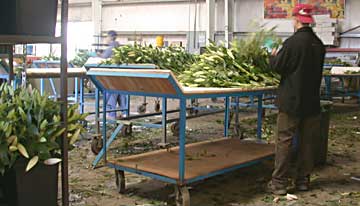 European
countries have had green-label programs for cut flowers for years,
but until recently, consumers in the United States haven't even
had the choice. That all changed when an upstart Internet company
called Organic Bouquet came along. The company's founder, Gerald
Prolman, was frustrated by the lack of organic flowers in the
mainstream cut flower market.
European
countries have had green-label programs for cut flowers for years,
but until recently, consumers in the United States haven't even
had the choice. That all changed when an upstart Internet company
called Organic Bouquet came along. The company's founder, Gerald
Prolman, was frustrated by the lack of organic flowers in the
mainstream cut flower market.
Left: Worker at Sun Valley Floral Farms. Photo by Amy Stewart.
He approached a number of growers about producing organic flowers to sell through OrganicBouquet.com. He also bought flowers from Latin American farms that had been certified through other country's programs. But he believed that the U.S. needed a standard of its own. He organized a few industry leaders, including Sun Valley president and CEO Lane DeVries, to begin working on a certification program for cut flowers sold in the United States.
'Not for the faint of heart'
Sun Valley's relationship with Organic Bouquet began in 2001 when Prolman asked DeVries to grow organic tulips for his company. "I wanted to try it," DeVries told me, "but let me tell you, it wasn't easy. Organic tulips are not for the faint of heart."
Growing organic flowers on a large scale presents a number of challenges. When a home gardener loses flowers to disease, they snip off the ruined blossoms and move on. But when acres of flowers succumb at once, it represents a tremendous loss of money, time and land taken out of production -- and that translates to a higher price tag for consumers.
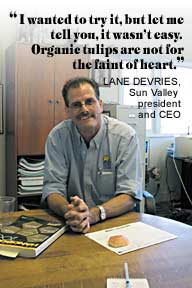 And
because Sun Valley's flowers are headed for the mass market --
wholesalers, grocery stores and retail florists -- they have
to meet the exacting standards of that market. At farmers' markets,
people buy locally grown flowers precisely because they are ephemeral,
old-fashioned and perfumed. They're grown on a small scale, by
farmers down the road, often completely organically. If the bugs
make a few tiny nibbles on the leaves, nobody objects.
And
because Sun Valley's flowers are headed for the mass market --
wholesalers, grocery stores and retail florists -- they have
to meet the exacting standards of that market. At farmers' markets,
people buy locally grown flowers precisely because they are ephemeral,
old-fashioned and perfumed. They're grown on a small scale, by
farmers down the road, often completely organically. If the bugs
make a few tiny nibbles on the leaves, nobody objects.
Right: Lane DeVries. Photo by Amy Stewart.
But Sun Valley's flowers have to compete in an entirely different marketplace. A grocery chain's lily specifications might include the requirement that there be five blossoms -- not four, not six -- on each stem. The flowers have to survive long journeys by plane and truck, during which they might not be in water at all. They have to arrive on time, in perfect shape, day after day. Like it or not, in order for organic produce to survive in the mass market, it has to live up to the impossible, blemish-free ideal set by conventional produce.
Also, the cut flower industry is behind the curve when it comes to research on organic methods. University agriculture departments conduct research into topics like sustainable viticulture techniques and organic production of strawberries and apples, but very little work has been done on flowers. It's no surprise that other crops take precedence: Resources are limited, flowers are only the eighth most valuable commodity in California, and the priority is on food crops.
In spite of these obstacles, Sun Valley took the plunge. Their organic tulips are planted farther apart to prevent disease and fertilized with only natural ingredients. They now grow a million organic tulips a year in Arcata, and the program is expanding by 30 percent annually. Next year, if you want to send organic tulips to your mother, it'll be as easy as ordering them from Organic Bouquet.
'Why organic flowers? We don't eat them.'
Prolman was initially dismayed by the lack of interest in organic flowers among many in the flower business. "The most common question I get asked," he said, "is 'Why organic flowers? We don't eat them.' But this is about the Earth. It's good for the environment and it's safer for workers."
Growers have a real incentive to clean up their act: They are keenly aware that flowers are a luxury. It only takes a little negative press to convince the public to buy chocolates instead of roses on Valentine's Day. Also, as more sophisticated organic methods are developed, the cost will go down. The high price of agricultural chemicals, many of which are petroleum-based and subject to fluctuations in the price of oil, combined with the extensive worker protection requirements and long re-entry times that keep workers out of the greenhouses after spraying, are all compelling reasons for even the most pragmatic grower to consider going green.
Although industry-designed certification programs are automatically suspect -- will Veriflora simply be a self-congratulatory award for doing little more than what the law requires? -- the fact is that no one else came forward with the resources or the vision.
And Prolman has plenty of vision. "From a business standpoint," he said, "there are 63 million educated and affluent consumers spending $230 billion annually on socially and environmentally responsible products. These people want to do their part."
SCS, the company that administers Veriflora, also conducts third-party certifications for the Forest Stewardship Council, the Marine Stewardship Council and Starbucks' sustainable coffee program, among others. In addition to Sun Valley, their independent inspectors have certified two farms in Ecuador and one other farm in California.
And the standard is still under revision: Right now, the International Labor Rights Fund is reviewing the labor provisions and may recommend changes. Dr. Margaret Reeves, staff scientist for the Pesticide Action Network (PAN), would like to see the list of prohibited chemicals expanded so that all of PAN's "Bad Actors" -- pesticides with known or probable acute toxicity -- are also banned, and eventually she'd like to see only organic pesticides permitted. She'd also like to see more assurances of accountability and transparency. "But this is all about transition," she said. "We take the industry where it is and we move in that direction. I am all in favor of transition."
'One of the good guys'
Michael Keyes, the SCS auditor who came to Sun Valley to conduct the inspections, told me that the company did have to make some changes to comply. "We found some chemicals in their warehouse that they couldn't have under Veriflora," he told me. "Lane said he hadn't used them for years, and I said, 'Great. Get rid of them.'" Sun Valley provided third-party documentation that the banned chemicals had been disposed of.
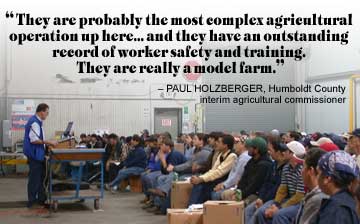 Left: DeVries addresses Sun Valley floral
Farm's entire crew. Photo by Amy Stewart.
Left: DeVries addresses Sun Valley floral
Farm's entire crew. Photo by Amy Stewart.
Keyes also used underground water monitoring devices called tensiometers to measure the flow of water in Sun Valley's fields. "We're checking to make sure they're not over-irrigating for two reasons," he said. "First, it's a waste of water. Second, it's a kind of surrogate measure for runoff. If there's water moving underground, there's a risk of contamination of the waterways." The tests did show over-irrigation in one field. Keyes said, "I told Lane about it, and he said, 'You mean I'm spending more on irrigation than I need to?' That put an end to it."
He also interviewed workers regarding pay rates, safety protocols and other matters. (Keyes speaks fluent Spanish, which is important when interviewing immigrant workers.) He found no labor violations, although some workers did report earning less than payroll records showed. "It turned out that they just didn't understand the difference between net and gross wages," he said. "It took a while to straighten that out. But that's a misunderstanding, not a violation."
He also observed that, like most agricultural enterprises, there are not many opportunities to move up. "That's also not a violation of the standard," he said, "It's just an observation I shared with Lane. But you know what? Sun Valley has more ways to measure efficiency and productivity than anybody I've ever seen. Employees get evaluated twice a year. When you do move up, it's because you've earned it."
In fact, at the regular all-farm meeting in Arcata last week, DeVries stood in front of the farm's entire crew and reviewed, first in English and then in Spanish, detailed numbers on productivity, recovery rate (the percentage of flowers that are not lost or damaged during the harvest), customer satisfaction, attendance and worker safety. Each team (the hyacinth team, the freesia team and so forth) was rated as a group, and prizes for innovative ideas and especially productive or accident-free crews ranged from T-shirts and backpacks, to a flat-screen TV and a Weber grill, to entry in their annual drawing for a car.
Overall, Keyes was impressed with Sun Valley's operation. (So far, only the Arcata farm has been certified; the company also owns three other farms in California.) "We'll keep monitoring," he said. "We'll do an annual inspection, surprise inspections, and we'll residue test their products. But really, Sun Valley's one of the good guys. We need more growers like them."
Sun Valley is also monitored for its pesticide use by the Humboldt County Agricultural Commissioner's office. Paul Holzberger, who was interim agricultural commissioner when I spoke to him last November, has conducted unannounced inspections and audited their training and safety records. He said, "They are probably the most complex agricultural operation up here ... and they have an outstanding record of worker safety and training. They are really a model farm."
IN
THE NEWS | ART BEAT | DIRT
PREVIEW
| THE HUM | CALENDAR
Comments? Write a letter!
© Copyright 2005, North Coast Journal, Inc.

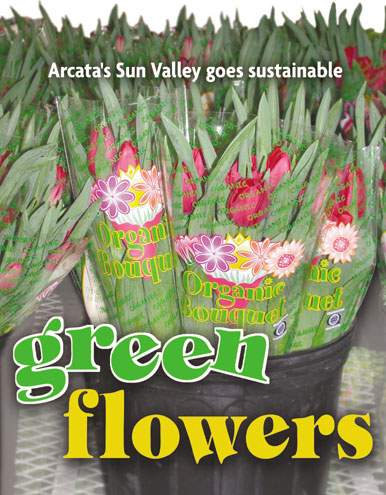
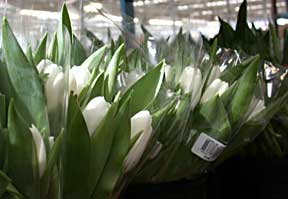
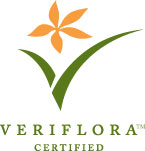 Putting
the Standard Into Practice
Putting
the Standard Into Practice